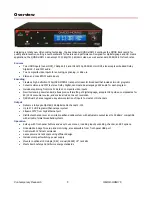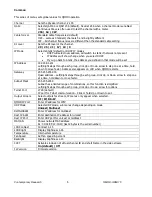
Contemporary Research
10
QMOD-HDMI1.5
Installation - Sources
Process
Connect source(s) to appropriate inputs
Perform
Quick Setup
from front panel to test operation and channel
Use USB Web pages or front panel menus to compete the setup
The front panel LEDs will light if 2-channel or scaling options are enabled
HDMI
Source can be 1080p 60/59.94/24 Hz, 1080i 60/59.94 Hz, 720p 60/59.94 Hz, or 480i 29.97 Hz
HDMI sources with HDCP will not pass through, use Kramer PT-1C if needed
Video/CC
The Video/CC input can be used to create an SD digital channel, or to feed Line 21 captioning data
Audio Inputs
The Coax and analog Stereo inputs can be assigned to any input
Dolby Dolby Digital will be passed through, stereo is converted to Dolby Digital stereo
When using 2 language tracks, the first will be Dolby Digital, the second MPEG1 Layer 2 stereo
Ethernet
The IP and Telnet ports are assigned via front panel or Web menus
Streaming options can be set locally or remotely
EAS
EAS (Emergency Alert System) operation is triggered by a latching input on the SW and Ground pins, a
5-12 VDC level on the V+ and Ground pins
The assigned EAS inputs, usually Video and Stereo, will broadcast on both programs when active
Multicast
Multicasting streams require a router with Multicast capability – the router creates the copies needed for user
requests. Use IP addresses 224.0.0.1 through 239.255.255.255, which are set aside for multicast streams.















